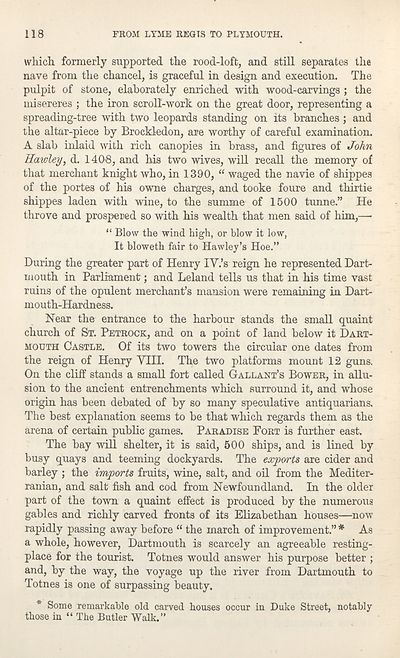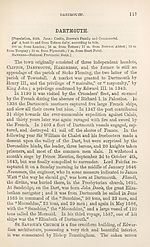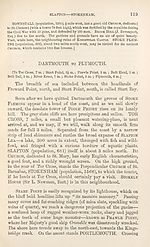Download files
Complete book:
Individual page:
Thumbnail gallery: Grid view | List view

118
FROM LYME REGIS TO PLYMOUTH.
which formerly supported the rood-loft, and still separates the
nave from the chancel, is graceful in design and execution. The
pulpit of stone, elaborately enriched with wood-carvings; the
misereres ; the iron scroll-work on the great door, representing a
spreading-tree with two leopards standing on its branches ; and
the altar-piece by Brockledon, are worthy of careful examination.
A slab inlaid with rich canopies in brass, and figures of John
Hawley, d. 1408, and his two wives, will recall the memory of
that merchant knight who, in 1390, “ waged the navie of shippes
of the portes of his owne charges, and tooke foure and thirtie
shippes laden with wine, to the summe of 1500 tunne.” He
throve and prospered so with his wealth that men said of him,—
“ Blow the wind high, or blow it low,
It bloweth fair to Hawley’s Hoe.”
During the greater part of Henry IV.’s reign he represented Dart¬
mouth in Parliament; and Leland tells us that in his time vast
ruins of the opulent merchant’s mansion were remaining in Dart-
mouth-Hardness.
Near the entrance to the harbour stands the small quaint
church of St. Petrock, and on a point of land below it Dart¬
mouth Castle. Of its two towers the circular one dates from
the reign of Henry VIII. The two platforms mount 12 guns.
On the cliff stands a small fort called Gallant’s Bower, in allu¬
sion to the ancient entrenchments which surround it, and whose
origin has been debated of by so many speculative antiquarians.
The best explanation seems to be that which regards them as the
arena of certain public games. Paradise Port is further east.
The bay will shelter, it is said, 500 ships, and is lined by
busy quays and teeming dockyards. The exports are cider and
barley ; the imports fruits, wine, salt, and oil from the Mediter-
ranian, and salt fish and cod from Newfoundland. In the older
part of the town a quaint effect is produced by the numerous
gables and richly carved fronts of its Elizabethan houses—now
rapidly passing away before “ the march of improvement.” * As
a whole, however, Dartmouth is scarcely an agreeable resting-
place for the tourist. Totnes would answer his purpose better ;
and, by the way, the voyage up the river from Dartmouth to
Totnes is one of surpassing beauty.
* Some remarkable old carved houses occur in Duke Street, notably
those in “ The Butler Walk.”
FROM LYME REGIS TO PLYMOUTH.
which formerly supported the rood-loft, and still separates the
nave from the chancel, is graceful in design and execution. The
pulpit of stone, elaborately enriched with wood-carvings; the
misereres ; the iron scroll-work on the great door, representing a
spreading-tree with two leopards standing on its branches ; and
the altar-piece by Brockledon, are worthy of careful examination.
A slab inlaid with rich canopies in brass, and figures of John
Hawley, d. 1408, and his two wives, will recall the memory of
that merchant knight who, in 1390, “ waged the navie of shippes
of the portes of his owne charges, and tooke foure and thirtie
shippes laden with wine, to the summe of 1500 tunne.” He
throve and prospered so with his wealth that men said of him,—
“ Blow the wind high, or blow it low,
It bloweth fair to Hawley’s Hoe.”
During the greater part of Henry IV.’s reign he represented Dart¬
mouth in Parliament; and Leland tells us that in his time vast
ruins of the opulent merchant’s mansion were remaining in Dart-
mouth-Hardness.
Near the entrance to the harbour stands the small quaint
church of St. Petrock, and on a point of land below it Dart¬
mouth Castle. Of its two towers the circular one dates from
the reign of Henry VIII. The two platforms mount 12 guns.
On the cliff stands a small fort called Gallant’s Bower, in allu¬
sion to the ancient entrenchments which surround it, and whose
origin has been debated of by so many speculative antiquarians.
The best explanation seems to be that which regards them as the
arena of certain public games. Paradise Port is further east.
The bay will shelter, it is said, 500 ships, and is lined by
busy quays and teeming dockyards. The exports are cider and
barley ; the imports fruits, wine, salt, and oil from the Mediter-
ranian, and salt fish and cod from Newfoundland. In the older
part of the town a quaint effect is produced by the numerous
gables and richly carved fronts of its Elizabethan houses—now
rapidly passing away before “ the march of improvement.” * As
a whole, however, Dartmouth is scarcely an agreeable resting-
place for the tourist. Totnes would answer his purpose better ;
and, by the way, the voyage up the river from Dartmouth to
Totnes is one of surpassing beauty.
* Some remarkable old carved houses occur in Duke Street, notably
those in “ The Butler Walk.”
Set display mode to:
![]() Universal Viewer |
Universal Viewer | ![]() Mirador |
Large image | Transcription
Mirador |
Large image | Transcription
| Antiquarian books of Scotland > Adventure and adventurers > Black's guide to the counties of Dorset, Devon, & Cornwall > (146) |
|---|
| Permanent URL | https://digital.nls.uk/142588130 |
|---|
| Description | Thousands of printed books from the Antiquarian Books of Scotland collection which dates from 1641 to the 1980s. The collection consists of 14,800 books which were published in Scotland or have a Scottish connection, e.g. through the author, printer or owner. Subjects covered include sport, education, diseases, adventure, occupations, Jacobites, politics and religion. Among the 29 languages represented are English, Gaelic, Italian, French, Russian and Swedish. |
|---|

